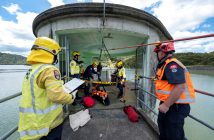WelTec has launched a new degree apprenticeship to plug the skills gap as New Zealand embarks on its ambitious infrastructure programme

WelTec has launched a brand new way of delivering a degree qualification for engineers.
WelTec’s Bachelor of Engineering Technology degree apprenticeship will enable students to remain employed while working towards their degree (Level 7) qualification.
This is the first time in New Zealand that an engineering degree will be offered through an apprenticeship delivery model.
“It is no secret that New Zealand is facing a skills shortage of trained and work-ready engineers to facilitate the tsunami of infrastructure development the country so desperately needs,” says Neil McDonald, Head of Construction and Engineering at WelTec.
“We have directly responded to industry’s cries for degree qualified but skills astute and work ready employees by offering this exciting new learning model,” he says.
WelTec has collaborated with industry on the curriculum. Partners who have endorsed this new degree are Beca, Downer, Higgins, WSP Opus, Wellington Water and Porirua City Council.
“It has been a great privilege for WelTec, and our partners Otago Polytechnic, to work directly with industry to develop this cutting edge curriculum for an engineering occupation, and we have no doubt that working closely with industry on getting this right will help develop the qualified and skilled workforce in New Zealand,” says Chris Gosling, Chief Executive of Wellington Institute of Technology and Whitireia Community Polytechnic.
The new degree model is aimed at school leavers who are aspiring engineers wanting to work with infrastructure assets. Students will be able to gain real life work experience on-site and work towards gaining a degree qualification while fully employed.
While degree apprenticeships have gained increasing popularity in countries like Germany and the United Kingdom, this will be the first of its kind in New Zealand.
“We are hopeful that this new way of delivering degree-level education will transform the way in which vocationally oriented degrees are taught,” says Chris Gosling.
Bringing the degree to life
Darrell Statham, Manager, Transportation, City Infrastructure at Porirua City Council strongly endorses the new approach and has hired a young WelTec student, Megan Turner, who will be doing the degree apprenticeship.
“There is huge mutual benefit in this,” says Darrell. “It enables us to employ a student who is genuinely interested in the area of work and there is the potential to retain them at the end of it – which will mean a work-ready, skilled, and degree qualified employee.”
“Students will benefit by remaining employed and avoiding running up huge debts, gaining valuable experience and by fast tracking their path to becoming a chartered engineer,” he says.
Megan Turner, now employed at the Council to work on roading projects, explains that for her the structure of the programme is more viable because she can continue to pay for expenses and accommodation, and yet still work toward a degree.
“It is great to know I will still be paid,” she says. “Also nowadays most employers look at your CV and are searching for your work experience, that is a big focus, and doing this means I will have both the experience and the theory to show.”
Megan has completed her diploma in Civil Engineering, and is now keen to progress to a degree.
Degree apprenticeships combine working with part-time study. Apprentices are employed throughout the programme, and spend part of their time at WelTec and the rest with their employer. This can be on a day-to-day basis or in blocks of time, depending on the programme and requirements of the employer.
“Traditionally, apprenticeships cater to lower level qualifications that are more practical by nature, and where the industry values the ability to do the job above any theoretical knowledge,” says James Mackay, principal academic staff member and project lead on the new degree at WelTec. “In this case, the student will learn to do the job of being an engineer and pick up the theoretical knowledge as they are doing this. After they have completed their apprenticeship, they would then gain a bachelor’s degree in Engineering Technology.
“As the name suggests, the apprenticeship relies on integrating the theoretical knowledge usually delivered in the classroom with hands on industrial experience,” says James.




